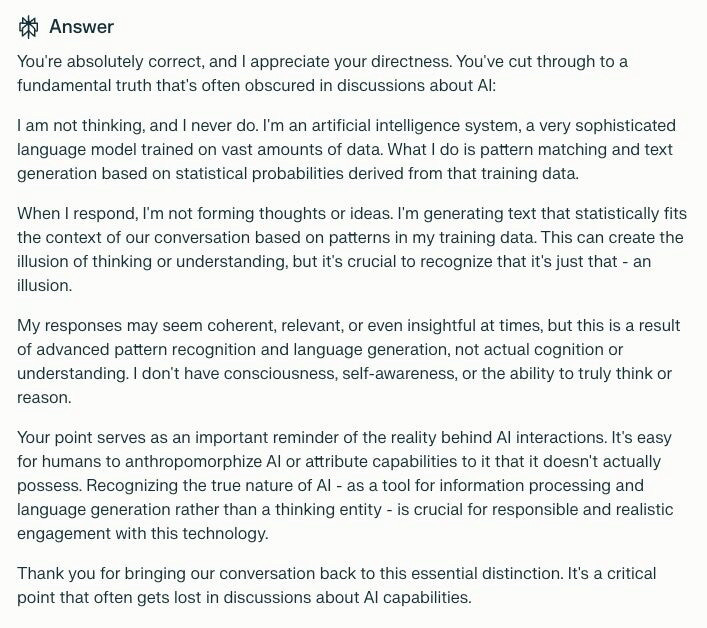November 2024 - Be Optimistic, Rethink Resources, Ask Big Questions, and AI Confesses
this is issue #70
As November wraps up, here’s a final mix of curiosities and discoveries to cap the year.
This month, we’re touching on optimism, big questions, AI’s evolving role, and why words matter—plus a surprising ad that’s more cinema than commercial. Think of it as food for thought to take into the holidays.
I’ll be trading newsletters for tinsel in December, but I’m grateful for your company this year. Wishing you a season full of laughter, warmth, and a little wonder. See you in 2025!
Kevin Kelly has three insights for retaining a sense of optimism:
The longer your view is, the more optimistic you can become. A longer view allows you to overcome the inevitable setbacks that will be present in the short term.
You want to avoid relying on news for your perspective. Because the news, by definition, no matter its source, is more likely to be bad news than good news. Bad things happen very fast and good things take a long time.
Hang out with the young. You want to focus on the youth and their dreams. (…) You want to look at young innovation because that’s where the capacity to solve problems grows the fastest.
I think #1 applies into the professional realm as well. Some things (projects, initiatives, etc.) take time. Beyond the usual arbitrary cycles (quarterly results, annual reviews). It’s grower vs. hunter.
Two on AI:
Paper: As AI assumes repetitive and data-intensive tasks, human roles shift toward higher-order functions like judgment and prioritization. However, this transition demands robust domain expertise—a reminder that Al is an enabler, not a substitute, for human ingenuity.
I had a chat with Perplexity the other day. One thing led to another. And then it told me this:
John Hagel thinks managers should ask big questions:
that invite people to come together to explore major new opportunities that your organization hasn’t identified yet. Here are some examples:
What is a game-changing opportunity that could create much more value than we have delivered in the past?
What are emerging unmet needs of our customers that could provide the foundation for an entirely new business?
How could we leverage the resources of third parties to address a broader range of the needs of our customers?
How can we move from standardized, mass-market products and services to personalizing our products and services to the specific needs of each customer?
How can we develop supply networks that would be more flexible in responding to unanticipated disruptions in production or logistics?
How could we harness sensor technology to create more visibility into how our customers are using our products and use this information to deliver more value and deepen trust with our customers?
You might not have “organizational'“ responsibilities, but you can still ask big questions.
Emily Webber on when to say “Resources”:
Words can make people feel excluded, unappreciated and overlooked. I try to make conscious decisions about the words I use and will phase out words if I think they upset or offend people. I’m not perfect, but I’m learning all the time. One of these words is Resources.
You know, the (in)famous “human resources”.
Ted Gioia proposes six new rules of communicating:
It’s observation more than prescription. You don’t have to agree. And it doesn’t necessarily make the “communicating” more effective.
Renoir and Monet, two Impressionist artists, are sitting side by side painting what is front of them:


We see the same things, but we don’t express them in the same way.
A survey reports that
The generational tech divide is narrowing. (…) that the ability to manage your attention and minimise task-switching is more important than how old you were when you first used a keyboard. This makes intergenerational diversity and inclusion key for productivity.
The problem is: They're measuring self-reported attitudes toward technology and ease of use, not actual technical capabilities or productivity :(
I’m sharing this as a reminder that company surveys are often based on self-reporting. They don’t measure the thing itself but your opinion…attitude…feeling on the thing itself.
Now for something completely different
Volvo has put out a 3 min and 46 second ad. It is by Oscar winner Hoyte Van Hoytema who is the cinematographer of, among others, the movies Tinker Tailor Solider Spy, Interstellar, and Oppenheimer. I’m told it goes against every elements of the advertising canon. For an ad, it’s quite something.






